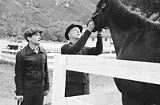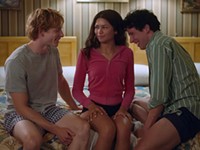[
{
"name": "500x250 Ad",
"insertPoint": "5",
"component": "15667920",
"parentWrapperClass": "",
"requiredCountToDisplay": "1"
}
]
Although losing may offer greater opportunity for contemplation and instruction and may more closely resemble the conditions of life itself, the sports movie generally deals in uplift and inspiration, often translated as victory over ostensibly insurmountable obstacles. Even those films that tell a sad story, like Pride of the Yankees or The Babe Ruth Story, employ the language and imagery of nobility and triumph. Most, however, like Rocky or Hoosiers or The Natural or Field of Dreams or The Bad News Bears or, appropriately, National Velvet, appeal to the common human desire for resolution, redemption, and happy endings.
Based on a runaway bestseller, and a true story at that, Seabiscuit, if one believes the publicity and the press, will probably win a trifecta of Academy Award nominations. A large, expansive work crammed with characters and stories, connected to a remarkable decade, the movie comprehends something of its time and place, the America of the Great Depression, in its account of an unlikely horse who became a great champion, capturing the imagination of an exhausted and dispirited people. Its retelling of an important history, its real characters, and its brilliant filming enliven a story that despite its veracity, still seems the invention of some Hollywood hack of an earlier era.
Accompanied by a number of voiceovers and a sort of chorus in the form of a manic radio sportscaster, the picture shows how the lives of three variously damaged men converged around a race horse. A wealthy automobile dealer, Charles Howard (Jeff Bridges) a gifted, reticent trainer, Tom Smith (Chris Cooper), and an angry, embittered jockey, Red Pollard (Tobey Maguire), all of them damaged in one way or another, make themselves whole through their devotion to a misunderstood and maltreated thoroughbred. Despite his small size and difficult nature, the horse also impresses all three men with his ability and above all, with his heart, the courage and determination that enable him to win against bigger, stronger competitors.
Although the picture never explains much about the character of Smith, it portrays the painful life of the jockey in great detail. Unemployed and impoverished in the Depression, Smith's parents abandon him to a kind of indentured servitude as a jockey, a profession he follows without much success in provincial racetracks around the country. The trainer recognizes a fire in the unhappy youth that matches the fierceness in Seabiscuit; putting the two together creates the right combination to turn them both into winners.
Howard, the wealthy owner, suffers the tragic loss of his only child, a sorrow that only begins to abate with his commitment to the horse and the jockey, who becomes a kind of surrogate son. He comes to believe so strongly in the abilities of both that he challenges the owner of the greatest thoroughbred in America, War Admiral, to a special two-horse race. The exploits of both horses, widely reported in the media of the day, especially through the relatively new technology of radio broadcasting, capture the imagination of a suffering people, who naturally sympathize with the underdog Seabiscuit.
The movie proceeds through a succession of races and preparations for races, as the three men work to turn the abused and neglected horse into a champion racer, transforming themselves in the process, healing their own wounds, learning something about courage and intensity from the fierce nature of the animal. The filming of those races displays the inventiveness and artistry of contemporary cinematography at its best, placing the camera (and the audience) right in the middle of the pack of galloping horses, suggesting the speed, confusion, and danger of the sport and the terrific skill of the riders. Contrasting with the energy and excitement of the races themselves, the most striking purely visual moments in the film actually occur in virtual silence --- an early morning at the track in Saratoga, as a horse emerges from the fog, a gallop through the autumnal countryside against a background of hills and woods and turning leaves, some lovely and ironic establishing shots of the grand houses of the rich in a time of economic disaster and shocking poverty.
Through the narration of the historian David McCullough, a number of still photographs, the familiar newspaper headlines of 1930s movies, newsreels, and the nutty radio announcer (William H. Macy), the picture attempts to suggest the context in which Seabiscuit raced, the conditions that made the horse a national figure. The inefficiency of the technique, along with the literal and labored back story, slows the movie down, and oddly, also underlines the neglect of a number of other issues that dominated the time --- gangsterism, J. Edgar Hoover and Al Capone, the rise of Fascism, the troubling possibility of an impending world war. The beloved underdog of history and sports cinema may have distracted the nation for a while from its many problems, but the inspirational story also masked other troubling realities in the failures of the economic and social system: Seabiscuit raced and won, but many of the people lost.
Seabiscuit, starring Tobey Maguire, Jeff Bridges, Chris Cooper, Elizabeth Banks, Gary Stevens, William H. Macy, Michael O'Neill, Annie Corley, Michael Angarano, Dyllan Christopher, Eddie Jones, David McCullough; based on the book by Laura Hillenbrand; written for the screen and directed by Gary Ross. Cinemark Tinseltown; Hoyts Greece Ridge; Loews Webster; Pittsford Plaza Cinema; Regal Culver Ridge; Regal Eastview; Regal Henrietta.
Latest in Movie Reviews
More by George Grella
-

Film Review: "Cake"
Jan 26, 2015 -

Film Review: "American Sniper"
Jan 19, 2015 -

Film Review: "Inherent Vice"
Jan 12, 2015 - More »






